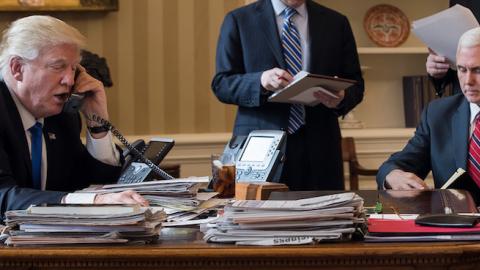Most commentators see the resignation of US National Security Michael Flynn this week as presenting a major setback to Russia-US relations, but a more balanced perspective suggests the departure could help ties in the long run. Flynn had become a lightning rod of criticism for his Russia ties and was an ineffective policy manager. With his removal – providing no further damaging revelations about Russia and the Trump administration emerge – the White House’s policymaking process could improve and Trump could engage Putin, who will likely remain Russia’s leader for years, on issues requiring Russian-US dialogue and coherent presidential direction.
Trump and Putin held their first official phone conversation on January 28. Compared to Trump’s other calls that day, this conversation appeared to have gone smoothly. According to Kremlin sources, Trump and Putin discussed nuclear nonproliferation, regional security, counterterrorism, and rebuilding bilateral trade and economic ties without yielding specific results.
The limited results were expected, given enduring constraints on bilateral ties. Both presidents express a desire to improve Russian-US ties, but their ability to progress beyond the traditionally tumultuous relationship is uncertain even with Flynn’s departure. Trump has raised both hopes and fears that his presidency will result in drastic changes to the relationship, but the impact of individuals on bilateral ties, even at the presidential level, is easy to exaggerate. For decades, there has been a recurring cycle of incoming US administrations coming to power, followed by initial improvements, stalemate, frustration and eventually regression.
Still, both men may have more impact than previous presidential pairs in shaping relations. Trump and Putin have similar worldviews. They regard traditional liberal internationalism and elite-driven globalization, such as that associated with the European Union, skeptically. They do not value international institutions in the abstract – they view nation states as the bedrock of world order and assess other structures in terms of how they advance national interests. Both are pragmatic leaders, seeking concrete deals for specific results, and esteem values like respect, patriotism and personal loyalty rather than transnational or ideological ties.
Putin has compromised with the United States in the past to advance Russia’s national interests. He praised Trump as a populist who comprehends the American people better than Washington’s traditional elites, expressed understanding for Trump’s plan to strengthen US nuclear forces and undoubtedly welcomes Trump’s denial of American moral superiority., Moreover, Putin’s political popularity, the weakness of Russia’s opposition parties and the Kremlin’s administrative resources give him substantial space to make genuine compromises, such as curtailing Russia’s implausible criticisms of US missile defenses and rendering US intelligence defector Edward Snowden back to the United States for trial.
Trump has said he aspires to a “fantastic relationship” with Putin though cautioning it might not happen. He told Fox News that, ‘I don’t know Putin, but if we can get along with Russia that’s a great thing…we go out together and knock the hell out of ISIS.” In Syria, Trump so far continues recent US policy of allowing Moscow to lead in promoting regional peace efforts and organizing foreign military support for the Assad regime while the US provides limited backing for a few anti-ISIS fighters. Washington and Moscow might also resurrect a version of the Russian-US Joint Implementation Group agreement, in which both sides pledged to reduce civilian casualties, foster a political transition in Syria and share more intelligence.
Yet, substantially extending bilateral counterterrorism cooperation elsewhere in the Middle East will prove difficult given Russian-US differences over Iran. Whereas the new US administration views the Iranian regime as a destabilizing regional force and a key abettor of foreign terrorism, Russian-Iranian strategic ties have increased substantially in recent years. Tellingly, Russian diplomats failed to join US sanctions in February against Tehran despite Iranian missile testing that sustains NATO support for the European missile defenses that Moscow opposes.
Trump continues to astound in how he challenges US political shibboleths and Washington opinion. He seems prepared to face down substantial foreign and domestic opposition to his Russia policy, evident in how even Republican senators grilled his cabinet nominees over any perceived pro-Russian sentiments. For example, Senator Marco Rubio castigated Rex Tillerson, now secretary of state, for refusing to characterize Putin as a war criminal for mass civilian deaths due to Russian-supported military actions in Syria. Other senators are moving to embed and expand Obama’s presidential sanctions in congressional legislation, making them harder to repeal. US allies in Europe, especially those in Eastern Europe, have expressed similar reservations about partnering with Putin.
The prospects for arms-control progress between Russia and the United States look bleak. Not only do Russian attacks on US missile defenses in Asia as well as Europe continue unabated. But Trump reportedly told Putin he was uninterested in extending the existing New START agreement because it’s a “bad deal” for the United States. And the Senate will not ratify a new arms treaty with Russia as long as Moscow is violating the 1987 Intermediate-Range Nuclear Forces Treaty. Although the Trump administration has not yet withdrawn from the Iran nuclear deal, which Russia supports, neither Washington, Moscow, nor any other power has succeeded in preventing North Korea from testing nuclear weapons and ballistic missiles.
In their November 14 and January 28 phone calls, Trump and Putin stressed the value of developing bilateral trade and commerce, which could stabilize the relationship that remains dominated by divisive Cold War–era topics such as nuclear deterrence, regional spheres of influence and concerns about international credibility. Unlike the China-US relationship, Russian-US commercial and humanitarian ties are remarkably underdeveloped relative to two large national populations and economies. Furthermore, Russian-US cultural ties would improve if Moscow relaxed its foreign agents law limiting US financial support for NGO partnerships and Washington renewed its fellowship programs to support academic exchanges with Russian educational institutions.
But the recent upsurge in fighting in Ukraine, immediately following the Trump-Putin call and reflecting Moscow’s reliance of coercive tools of influence in former Soviet republics, will make it harder to remove the sanctions constraining such socioeconomic cooperation. US Ambassador to the UN Nikki Haley blamed Moscow for the hostilities and said that the Crimea-related sanctions on Russia would persist until that peninsula returned to Ukrainian sovereignty. Although Haley left open the question of possibly repealing of other US sanctions on Russia, congressional and popular support for near-term sanctions repeal is minimal. Ukraine’s supporters in Congress claim that Putin was testing Trump’s resolve. Trump may want a deal with Russia regarding Ukraine, but certainly does not want to look weak at home or abroad, which would encourage Congress to tie his hands and reduce US leverage to secure Russian concessions.
Fundamentally, even substantially improved Russian-US relations may have only limited effect on boosting global security. Unlike during the Cold War, when Washington and Moscow could determine many regional and global developments, the unending fighting in Syria and Ukraine and Pyongyang’s missile provocations are only the latest example of how the two countries, like other nations, are more event-responders than event-makers.















